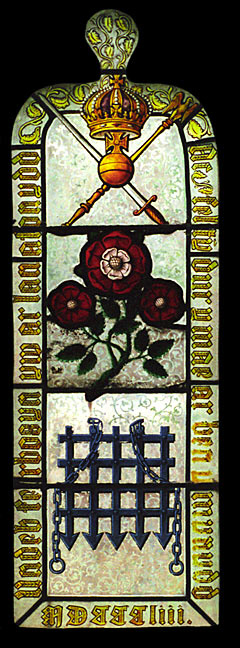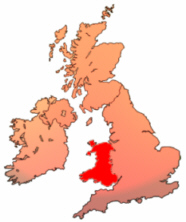
TRIBE
OF LEVI
WALES
LEVITE
PRIESTS = DRUIDS
'And
she [Leah] conceived again, and bares a son; and said, 'now this time
will my
husband be joined unto me, because I have born him three sons:
therefore was
his name called Levi.”
Levi
was the founder of the Levite tribe of ancient Israel. He was a son of
Leah and
Jacob, who was in turn a son of Isaac, the son of Abraham.
The
name LEVI means: #3878 Leviy lay-vee' from #3867; attached; Levi. #3867
lavah
law-vaw', properly, to twine, i.e. [by implication] to unite, to
remain; also
to borrow [as a form of obligation] or to lend, abide with, borrow[er],
cleave,
join [self], lend[er].
Levi
means to be attached to the Lord and to his priestly duties. The
Levites were
on 'loan' to the other tribes, as they belonged to the Lord. Today,
Levi is
attached to Joseph, and in turn, Wales, as Levi, has been subjected to
England.
'Behold,
I have taken your brethren the Levites from among the children of
Israel: to
you they are given as a gift for the
Lord, to do the service of the tabernacle of the congregation. And ye
shall
know that I have sent this commandment unto you, that my covenant might
be with
Levi, saith the Lord of hosts.' Wales, as Levi, owns the promise of the
Lord.
Princess of Wales [Diana] was on loan from the Lord and was sent to be
mother
to the two Princes, William and Harry. Perhaps her intent to marry a
Arab
Gentile was prevented by the Lord as well.
Deuteronomy
10:8 ‘At that time the Lord separated the tribe of Levi, to bear the
ark of the
covenant of the Lord, to stand before the Lord to minister unto him,
and to
bless in his name, unto this day’. Deut. 33:10 ‘They shall teach Jacob
thy
judgments, and Israel thy law: they shall put incense before thee, and
whole
burnt sacrifice upon thine altar’.
‘And
Aaron shall offer the Levites before the Lord for an offering of the
children
of Israel, that they may execute the service of the Lord’.
In
the Book of Malachi, God explains why He chose the Levites to be His
priests.
'Then
you will know that I have sent this commandment to you, that My
covenant may
continue with Levi,' says the Lord of hosts. 'My covenant with him was
one of
life and peace, and I gave them to him as an object of reverence; so he
revered
Me and stood in awe of My name. True instruction was in his mouth and
unrighteousness was not found on his lips; he walked with Me in peace
and
uprightness, and he turned many back from iniquity.” [Malachi 2:4-6].
“Then
David said, None ought to carry the Ark of God but the Levites: for
them hath
the Lord chosen to carry the Ark of God and to minister unto him
forever”.
Wales carried the ‘Ark’ of God.
‘Seemeth
it but a small thing unto you that the God of Israel hath separated you
[the
Levites] from the congregation of Israel, to bring you near to Himself
to do
the service of the tabernacle of the Lord, and to stand before the
congregation
to minister unto them? The Levites were then taken from among the
tribes and
cleansed to be priests - to minister to the tribes.'
Deut
33:10 'They [Levites] shall teach Jacob thy judgments, and
Israel thy law: they shall put incense before thee, and whole burnt
sacrifice
upon thine altar.' Num 1:50 ‘But
thou shalt appoint the Levites
over the tabernacle of testimony, and over all the vessels thereof, and
over
all things that belong to it: they shall bear the tabernacle, and all
the
vessels thereof; and they shall minister unto it, and shall encamp
round about
the tabernacle. Num 8:6 Take the Levites from among the children of
Israel, and
cleanse them’.
The
Bible describes Levi as a clever but ferocious soldier, prone to fits
of anger,
and tells of when Shechem [a Hivite] had raped Levi's sister, Dinah, so
when
Shechem came to request to be given Dinah as a wife, Jacob's sons
agreed to the
marriage on the condition that the Hivites are to be circumcised.
Shechem
agreed to this, but on the third day after the mass circumcision, while
the
Hivites were still sore, Levi and Simeon led an attack on the Hivite
city,
killed all the Hivite men, and divided their wealth [Genesis 34]. Levi
was also
involved with his brothers in the plot to kill his half brother Joseph.
Jacob
refused to make Levi his heir because of his anger, so the Levites
still belong
to the Lord. [Genesis 49:5].
WALES
AS LEVI
One
of the most interesting clues that I have found for the connection of
Wales to
the Levite priests is the name Cymry, which the Welsh called themselves
and
their land. The Hebrew word #3650 kimriyr,
means to be 'left in darkness', in obscuration, as if caused
from shrinkage
from [the] light, such as an eclipse. The Hebrew word for priest is
'kohen',
pronounced 'ko-hane', which means 'to mediate in religious services, or
to
officiate as an acting priest. The Druids were known as priests to the
ancient
Celtic peoples, and more than likely, were descendants of the Levite
tribe of
priests, however, the fact that there were Celtic Druids will be taken
in
conjunction with ALL the other evidence that supports the location of
the 'lost
tribes of Israel'.
‘Priesthood’
is Hebrew #3550, 'khunnah'. In the ancient Hawaiin language, ‘huna’
means
secret, Kahuna, means ‘priest of the secrets’. While I am not
particularly
inclined to take one word and make a case out of it, but if there are
at least
three other clues going all in the same direction, words are
considered. #3648
'kamar' means to be deeply affected with passion [love or pity], to be
blackened in the heart, yearn. #3649 kamar {kaw-mawr'} means shrunken,
as if
from self ruination, i.e. a priest that has lost his true purpose, and
without
their Lord to minister to, the priest practices as an idolatrous
priest. The
Levites probably were suffering from a broken heart once the kingdom of
Israel
was destroyed – were the Levites still practicing priests as Druids? We
may
never know the truth behind the Druids.
The
Welsh have long been known for their interest in pedigrees and
ancestors, and
perhaps they have long been in search for their connection to the
'holy'
people. The Levites never had a territory, or sovereign nation of their
own for
they have always been identified with the tribe of Judah. Following in
the same
pattern, Wales was never granted a kingdom of their own, and today, as
Levi,
Wales lies under the wing of the United Kingdom of Great Britain. How
fitting
it is then, for the Prince of Wales to be under the Scottish Queen.
The
name 'Wales' comes from a German root word meaning foreigner, so we
can't
expect to find any clues in that name. At one time, the vast majority
of the
population in Wales only spoke Welsh. Welsh is a Celtic language, and
experts
in linguistics say it is closely related to the Hebrew language,
containing
many similarities. The decision by Henry VIII in 1536, states that all
courts
of law had to use English rather than Welsh, which created a great deal
of
anger among the Cymry [Welsh peoples]. Another law passed at this time
stated
that people could only be appointed to official posts if they spoke
English.
The
Druids were not only the priests, doctors, poets, and minstrels of
ancient
Wales - where their center was located; but they were the teachers who
retained
the sacred knowledge of ancient Hebrew times. The word Druid is derived
from
DRU, which means Oak Tree, which was sacred to the Druids. However,
more
credible still, since we now know who the Druids were, is the Gaelic
word 'Druidh',
describing a wise man, or the holder of much secret knowledge. The
wisdom these
priests were privy to consisted of healing potions - as in herbalism,
they were
teachers, legislators, astronomers, astrologers, chemists, musicians,
poets,
the holders of all religious holy days and rituals, philosophers, and
judges.
The Druids believed in a Supreme
Power over the Universe and the belief in the Immortality of the human
soul. In
Wales, there were three classes of Druids - the Bards, the Ovates, and
the Druid priests. Bards
were the
historians and teachers, Ovates were the herbalist and doctors, and
Druids were
the priests. So revered were the Levite-Druid priests and Bards, that
schools
were set up to learn of their vast knowledge - especially that of
medicinal
practices. The immense power of the Druids became the weakness for the
Celtic
people. No culture that is ruled by priests, drawing their authority
from
spiritual sanctions, is capable of ruling a kingdom. The Druid's
adherence to
their religion inevitably helped bring down their kingdom of Welsh
chieftains.
After the advent of Christianity, the Druids were not allowed to
practice their
priestly duties at all.
Isaiah 35:7 ‘And the parched ground
shall become a pool, and the thirsty land springs of water: in the
habitation
of dragons, where each lay, shall be
leeks with reeds and rushes’.
Did you catch that – more cookie
crumbs. The LEEK is a national emblem of Wales and the Welsh flag
depicts a red
dragon. The Welsh word for dragon is 'draig' or 'ddraich', which means
leader,
warrior, or chieftain, and denotes bravery. Regarding the leek,
according to
legend, Saint David ordered his Welsh soldiers to identify themselves
by
wearing this herb on their helmets when going into battle against the
Saxons. Supposedly
this order came about because their troop at the time, was situated in
a leek
field amongst the reeds and rushes. Legend has it that some 60 years
after St.
David's death, in 640 CE, the Briton King Cadwallader was greatly
disturbed by
invading Saxons. To distinguish themselves from the enemy, the Welsh
wore leeks
in their hats and subsequently gained a great victory over their
enemies, so
maybe there was a secret found within the leek.
It seems ironic that one of the
early kingdoms of Wales was the 'kingdom of Dyred', which is a Celtic
take on
the name 'David', the beloved king of the 'lost tribes of Israel'. The
patron
saint of Wales is St. David, with St. David's day celebrated annually
on March
1st.
The ancient words of Geraldus
Cambrensis could have served to inspire his followers:
'The
English fight for power; the Welsh for liberty; the one to procure gain
the
other to avoid loss. The English hirelings for money; the Welsh
patriots for
their country.' Ironically, the Levites were patriots for their Lord.
Seems the
Levites need to be loyal to a good cause – it is in their blood.


